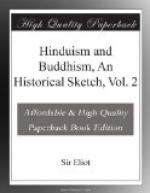I-Ching observes that both Vehicles agree in prescribing the same discipline, in prohibiting the same offences and enjoining the practice of the noble truths. His views, which are substantially those of Hsuean Chuang,[257] must be those current in the seventh century when the Hinayana was allowing the Mahayana to overgrow it without resistance, but the relations of the two creeds are sometimes stated differently. For instance the Angulimaliya sutra,[258] known only in a Tibetan translation, states that whereas for the Hinayana such formulae as the four truths and the eightfold path are of cardinal importance, the Mahayana does not recognize them, and it is undoubtedly true that the Vaipulya sutras frequently ignore the familiar doctrines of early Buddhism and hint that they belong to a rudimentary stage of instruction.
I-Ching makes no mention of persecution but he deplores the decay of the faith. “The teaching of the Buddha is becoming less prevalent in the world from day to day” he says. “When I compare what I have witnessed in my younger days and what I see to-day in my old age, the state is altogether different and we are bearing witness to this and it is hoped we shall be more attentive in future.” Though he speaks regretfully of lax or incorrect discipline, he does not complain of the corruption of the faith by Tantrism and magical practices. He does however deprecate in an exceedingly curious passage the prevalence of religious suicide.[259]
Except for progressive decay, the condition of Indian Buddhism as described by the two pilgrims is much the same. Meals were supplied to monks in the monasteries and it was no longer usual to beg for food in the streets, since the practice is mentioned by I-Ching as exceptional. On Upavasatha days it was the custom for the pious laity to entertain the monks and the meal was sometimes preceded by a religious service performed before an image and accompanied by music. I-Ching describes the musical services with devout enthusiasm. “The priests perform the ordinary service late in the afternoon or in the evening twilight. They come out of the monastery




